Br
Bradlaugh, Charles (1833-1891)
English journalist and critic of Marx.
Bracke, Wilhelm (1842-80)
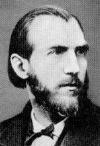 German Social-Democrat, bookseller and publisher. He was originally a Lasallean but took part in the foundation of the German Social Democratic Workers' Party in Eisenach in 1869 and was a member of the Party Committee. He and W Liebknecht joined Marxist and Lassallean principles. In 1870, on account of the manifesto issued by the Party Committee against the war, he was arrested and imprisoned in a fortress. He criticized the draft program submitted to the Gotha Congress; in 1878, owing to illness, he withdrew from party work.
German Social-Democrat, bookseller and publisher. He was originally a Lasallean but took part in the foundation of the German Social Democratic Workers' Party in Eisenach in 1869 and was a member of the Party Committee. He and W Liebknecht joined Marxist and Lassallean principles. In 1870, on account of the manifesto issued by the Party Committee against the war, he was arrested and imprisoned in a fortress. He criticized the draft program submitted to the Gotha Congress; in 1878, owing to illness, he withdrew from party work.
Brandes, Georg Morris (1842-1927)
Danish critic, publicist and historian of history and literature.
Brandler, Heinrich (1881-1967)
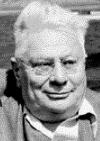 Building worker, born in the Sudetenland, of Austrian nationality, lame since early youth owing worker to accident at work, trade-union activist 1897, sentenced for violence in 1900. Joined SPD (Sozialistische Partei Deutschlands, Social-Democratic Party) in 1901, worked until 1904 in Hamburg, where he led building workers’ union, then in Bremen during 1904–8, where he was active in trade union and Socialist Youth. In Switzerland during 1908–14. In Chemnitz in June 1914, secretary of the building workers’ union. Expelled from SPD (Sozialistische Partei Deutschlands, Social-Democratic Party) with Heckert in 1915, driving force in Spartacus group, joined USPD in 1917 despite reservations. Deported from Germany as foreigner in October 1918, he acquired German nationality thanks to Eisner’s government in Bavaria. Returned to Chemnitz, founded there both Der Kämpfer and most powerful local organisation of KPD(S). Supported Levi against ultra-Left, organised election of workers’ councils in Chemnitz immediately after Kapp Putsch, and was chairman of Chemnitz workers’ council, where he developed ideas foreshadowing those of the workers’ united front. Elected to Zentrale in April 1920 and reported to Unification Congress on questions of organisation. Took Levi’s place as KPD (Kommunistischen Partei Deutschlands/German Communist Party) Chairman in February 1921 and assumed Party leadership during March Action. In June, sentenced to five years imprisonment in a fortress. Released in November, spent some time in Moscow as member of Comintern Presidium. Returned to Germany in autumn 1922, carried out functions of General Secretary. In 1923 stood at head of KPD (Kommunistischen Partei Deutschlands/German Communist Party), and attacked by Left, whose expulsion he urged many times in vain. Head of State Chancellery of Zeigner’s government, after having taken part in Moscow in preparations for insurrection. Communist spokesman at Chemnitz Conference, called off insurrection after left Social Democrats retreated. Held responsible for defeat in Germany in 1923, and tried in vain to assert that he did not support Left Opposition in Russia. In Moscow until October 1928, returned to Germany against KPD’s decision, expelled in January 1929. Founded KPO, but did not join SAP. Emigrated to France, interned during 1939–40, took refuge in Cuba during 1941–7, then in Britain, returned to Germany in 1949, and settled in Hamburg where he led Arbeiterpolitik group.
Building worker, born in the Sudetenland, of Austrian nationality, lame since early youth owing worker to accident at work, trade-union activist 1897, sentenced for violence in 1900. Joined SPD (Sozialistische Partei Deutschlands, Social-Democratic Party) in 1901, worked until 1904 in Hamburg, where he led building workers’ union, then in Bremen during 1904–8, where he was active in trade union and Socialist Youth. In Switzerland during 1908–14. In Chemnitz in June 1914, secretary of the building workers’ union. Expelled from SPD (Sozialistische Partei Deutschlands, Social-Democratic Party) with Heckert in 1915, driving force in Spartacus group, joined USPD in 1917 despite reservations. Deported from Germany as foreigner in October 1918, he acquired German nationality thanks to Eisner’s government in Bavaria. Returned to Chemnitz, founded there both Der Kämpfer and most powerful local organisation of KPD(S). Supported Levi against ultra-Left, organised election of workers’ councils in Chemnitz immediately after Kapp Putsch, and was chairman of Chemnitz workers’ council, where he developed ideas foreshadowing those of the workers’ united front. Elected to Zentrale in April 1920 and reported to Unification Congress on questions of organisation. Took Levi’s place as KPD (Kommunistischen Partei Deutschlands/German Communist Party) Chairman in February 1921 and assumed Party leadership during March Action. In June, sentenced to five years imprisonment in a fortress. Released in November, spent some time in Moscow as member of Comintern Presidium. Returned to Germany in autumn 1922, carried out functions of General Secretary. In 1923 stood at head of KPD (Kommunistischen Partei Deutschlands/German Communist Party), and attacked by Left, whose expulsion he urged many times in vain. Head of State Chancellery of Zeigner’s government, after having taken part in Moscow in preparations for insurrection. Communist spokesman at Chemnitz Conference, called off insurrection after left Social Democrats retreated. Held responsible for defeat in Germany in 1923, and tried in vain to assert that he did not support Left Opposition in Russia. In Moscow until October 1928, returned to Germany against KPD’s decision, expelled in January 1929. Founded KPO, but did not join SAP. Emigrated to France, interned during 1939–40, took refuge in Cuba during 1941–7, then in Britain, returned to Germany in 1949, and settled in Hamburg where he led Arbeiterpolitik group.
Branting, Hjalmar (1860-1925)
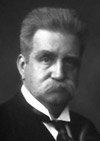 Karl Hjalmar Branting wrested control of the Social-Demokraten editorship from August Palm and took Swedish Social-Democracy in a reformist direction. Prime Minister of Sweden, serving for three separate periods in 1920, 1922-1923, and 1924-1925. Awarded Nobel Peace Prize in 1921.
Karl Hjalmar Branting wrested control of the Social-Demokraten editorship from August Palm and took Swedish Social-Democracy in a reformist direction. Prime Minister of Sweden, serving for three separate periods in 1920, 1922-1923, and 1924-1925. Awarded Nobel Peace Prize in 1921.
Born in Stockholm, Branting was the only child of Professor Lars Branting, one of the principal developers of the Swedish school of gymnastics. He was educated at the exclusive Beskow School in Stockholm, passing his matriculation examination at the age of seventeen, with a distinguished record in mathematics and Latin. After studying at the University of Uppsala for the next five years, concentrating on mathematics and astronomy, he accepted a position in 1882 as an assistant to the director of the Stockholm Observatory.
But Branting was a social scientist as well as a natural scientist. By 1880 he had adopted liberal views, which had their origin in his studies and observations on social and cultural questions. In 1881 when he learned that the Stockholm Workers Institute, which provided lectures and courses of study for workingmen, had been denied financial support by the city, he contributed from his personal funds the amount necessary to keep the Institute open. For Branting the year of 1883 proved decisive. In Paris he heard the lectures of the French Socialist, Paul Lafargue; in Zurich he learned about German socialist doctrine from Eduard Bernstein, who was publishing Der Sozial-Demokrat while in self-imposed exile; wherever he went - including Russia - he tested his thinking in discussion with workingmen and social philosophers.
Giving up his scientific career in 1884, Branting joined the staff of the radical Stockholm paper Tiden [The Times] as foreign editor. He became editor-in-chief the next year but, like his predecessor in that office, was unable to solve the financial crises which periodically afflicted the paper. Upon its demise in 1886, Branting became chief editor of another socialist newspaper, Socialdemokraten, making this journal, in the course of his thirty-one years' association with it, a textbook for the education of the workers and a potent force in Swedish politics. Radical though Branting was, he taught evolution rather than revolution, believing that true democracy could not exist without the active involvement of the workingmen and that any socialist philosophy not based on the democratic concept was a mockery.
Branting formed workingmen's clubs, helped to organize unions, supported strikes, directed strategy. In demand as a speaker at innumerable meetings, he became one of the most skillful speakers in the land, noted for his logical argument, precision of style, blunt honesty, warmth of personality.
He was the directing genius behind the formation of the Social Democratic Labor Party in 1889, serving as its president from 1907 until his death. To advance the aspirations of the workingman, political action should, he believed, be enmeshed with industrial action, not superimposed upon it.
Elected to the Lower Chamber of the Parliament in 1896 from a workingmen's constituency in Stockholm, Branting was the sole Social Democrat to hold a seat until 1902. In Parliament he gave visibility to the rights of workers, decried legislation against unions, pled for universal suffrage, supported national defence, and advocated peaceful solution of the crisis between Sweden and Norway over the dissolution of the union in 1905. Meanwhile, the power of his party grew: in 1902 there were four Social Democrats out of a total membership of 230 in the Lower Chamber of the Parliament; in 1903, thirteen; in 1908, thirty-four; in 1911, sixty-four; in 1914, seventy-two; in 1921, a hundred and ten.
By 1917, the Social Democrats were a strong third party in what had traditionally been a two-party system. In that year the Social Democrats joined the Liberals in a coalition government, with Branting as minister of finance. The coalition sponsored the constitutional reform of 1919, extending the franchise to all males (women receiving the vote in 1921 under Branting's government), but it was dissolved when the Liberals refused to support the Social Democrats' demands for tax reform, unemployment insurance, and nationalization.
Branting then formed his first government, depending upon Liberal support since he did not command a majority in Parliament. When the power of the Liberal Party appeared to be diminishing, he dissolved the Parliament in October of 1920, but the ensuing elections went against him. He returned to the prime ministry in October, 1921, retaining the foreign affairs portfolio and departed in April, 1923, when faced by a combination of the Liberals and Conservatives. When the elections of 1924 gave the Social Democrats a majority over each of the other two parties, Branting, for the third time, became prime minister, resigning in January, 1925, when his health failed.
See Branting Archive.
Brassilov, Mexil Alexeyevich (1853-1926)
Czarist General. Led invasion of Galicia 1915-1917. Commander-in-Chief under Provisional Government June-July 1917, replacing Alexeyev. Commanded the July offensive. Replaced by Kornilov. Joined the Red Army in 1920. Retired 1924.
Brass, Otto (1875–1960) .
File-cutter, in SPD (Sozialistische Partei Deutschlands, Social-Democratic Party) in 1897. Cashier in insurance firm, then administrator of newspaper. Leader of radical wing in the Ruhr, co-founder of USPD. Chairman in 1919 of council of workers and soldiers in Remscheid, delegate to Berlin in December. USPD deputy at Weimar. Organised strike in the Ruhr in 1919 and struggle against Kapp in 1920, which led to his being charged with high treason. In USPD Left, Joint Chairman of the Halle Congress. Elected to VKDP (Vereinigte Kommunistische Partei Deutschlands/United Communist Party of Germany) Zentrale, resigned at same time as Levi and Däumig in February 1921. As minority delegate in Moscow immediately after March Action, publicly supported Levi for months following his expulsion, and, with Friesland and Malzahn, organised new right opposition. Expelled in January 1922, returned that year with Levi to USPD and then to SPD. From then until 1933 played minor role, but placed under surveillance by the Nazis. Arrested in 1945 for underground activity, liberated by Red Army. In leadership of SPD (Sozialistische Partei Deutschlands, Social-Democratic Party) in Russian zone, signed appeals for reconstitution of free trade unions and for fusion of Social-Democratic and Communist Parties. On this basis, he was co-founder of SED.
Braun, M.J. (Miechislaw Bronski, 1882–1937) .
Polish, Social Democrat in 1902, took part in 1905 Revolution, served a year in prison. Emigrated to Switzerland in 1907, active in Swiss Social-Democratic Party and, in opposition to Luxemburg and Jogiches, supported Warsaw Committee, which Radek also supported. Close to Lenin, took part in Zimmerwald and Kienthal Conferences, a leader of Zimmerwald Left. Accompanied Lenin in ‘sealed train’ in April 1917, took part in Russian Revolution. Appointed consular representative in Berlin in 1918, made contact with German revolutionaries. Deported in November. Returned to Germany in 1919, was member of Western European Secretariat and leadership of KPD(S) under a pseudonym. Sharply criticised for Zentrale’s position at beginning of Kapp Putsch and recalled to Moscow shortly afterwards. Lectured at University of Moscow, active in Polish Communist Party, joining its Political Bureau. Arrested and executed during purges.
Braverman, Harry (1920-1976)
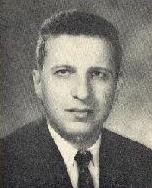 Harry Braverman joined the Trotskyist movement in 1937 while a member of the YPSL, the Socialist Party youth movement. Although without formal academic training, he developed into a powerful theoretician and organiser. In the early 1950s he was a leader of the so-called Cochranite tendency and was expelled with them from the SWP. He then became editor of The American Socialist until its demise in 1959. During the early 1960s he worked as an editor for Grove Press, where he was instrumental in publishing The Autobiography of Malcolm X. In 1967 he took over the editorship of Monthly Review Press, where he worked until his death. His most important work was the classic Labor and Monopoly Capitalism, which was published shortly before his death from cancer in August 1976.
Harry Braverman joined the Trotskyist movement in 1937 while a member of the YPSL, the Socialist Party youth movement. Although without formal academic training, he developed into a powerful theoretician and organiser. In the early 1950s he was a leader of the so-called Cochranite tendency and was expelled with them from the SWP. He then became editor of The American Socialist until its demise in 1959. During the early 1960s he worked as an editor for Grove Press, where he was instrumental in publishing The Autobiography of Malcolm X. In 1967 he took over the editorship of Monthly Review Press, where he worked until his death. His most important work was the classic Labor and Monopoly Capitalism, which was published shortly before his death from cancer in August 1976.
Note: When writing for Fourth International he used the pseudonym Harry Frankel
Brentano, Franz (1838 - 1917)
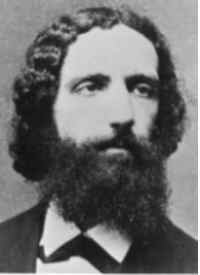 German philosopher generally regarded as the founder of Act Psychology, or intentionalism, which concerns itself with the acts of the mind rather than with the states of mind or the impact of stimuli upon consciousness; his “empirical psychology” develops empiricism in the direction of subjective idealism, with a sharp line drawn between physical and psychical phenomena and denying any objective content for ideas, deeply connected with his Theism; Brentano was an important influence on Husserl.
German philosopher generally regarded as the founder of Act Psychology, or intentionalism, which concerns itself with the acts of the mind rather than with the states of mind or the impact of stimuli upon consciousness; his “empirical psychology” develops empiricism in the direction of subjective idealism, with a sharp line drawn between physical and psychical phenomena and denying any objective content for ideas, deeply connected with his Theism; Brentano was an important influence on Husserl.
Ordained a Roman Catholic priest in 1864, Brentano became a Professor at the University of Würzburg in 1872, but doubts over the dogma of papal infallibility led to his resignation from his post, and eventually from the priesthood in 1873.
Brentano then began writing one of his best-known and most influential works, Psychology from an Empirical Standpoint (1874), in which he tried to present a systematic psychology as a “science of the soul”.
Brentano's psychology is based on a revival of the scholastic theory of “intentional existence”, that is, when one “directs the mind to something” it may thereby be deemed to have “immanent objectivity”, without any reference to a concept of objective existence outside of consciousness. Brentano classified different modes of intention: perception and ideation, including sensing and imagining; judgment, including acts of acknowledgment, rejection, remembering, desire, etc.. The objective existence of the object of intention is beside the point.
Brentano was eventually accepted back to his post in 1881 where his students included Sigmund Freud, psychologist Carl Stumpf, philosopher Edmund Husserl, and Tomás Masaryk, the founder of modern Czechoslovakia.
Breshkovskaya, Catherine (1844-1943)
Russian revolutionary. Exiled to Siberia for her political beliefs for much of her adult life. When released she soon left the R.S.F.S.R., as a result of her opposition to the government.
Brezhnev, Leonid (1906-1982)
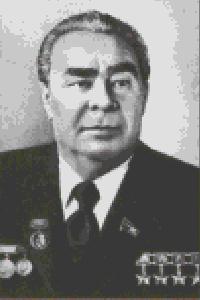 Like Khrushchev, a Ukrainian; engineer, CPSU official from 1938, Supreme Soviet from 1950, CC 1953, Politburo 1957, President of the Soviet Union in 1960 as ally of Khrushchev; succeeded Khrushchev as First Secretary of SU in October 1964, and was the principal member of the 'troika' with Kosygin and Gromyko. Ended the criticism of Stalin and partially rehabilitated him. Led reaction from Khrushchev's policy of political liberalisation and decentralisation. Under Brezhnev the corruption and parasitism of the bureaucracy grew in proportion to the decline in the economy, and set the foundation for the collapse of the Soviet Union.
Like Khrushchev, a Ukrainian; engineer, CPSU official from 1938, Supreme Soviet from 1950, CC 1953, Politburo 1957, President of the Soviet Union in 1960 as ally of Khrushchev; succeeded Khrushchev as First Secretary of SU in October 1964, and was the principal member of the 'troika' with Kosygin and Gromyko. Ended the criticism of Stalin and partially rehabilitated him. Led reaction from Khrushchev's policy of political liberalisation and decentralisation. Under Brezhnev the corruption and parasitism of the bureaucracy grew in proportion to the decline in the economy, and set the foundation for the collapse of the Soviet Union.
Briand, Aristide (1862-1932)
French politician that was expelled from the French Socialist Party in 1906 for accepting an office in the Clemenceau cabinet. Leader of the wartime coalition cabinet from 1915 to 1917. Representative to the League of Nations from 1925 to 1932.
Bridgman, Percy (1882 - 1961)
American physicist who carried out path-breaking research into the behaviour of materials at high temperatures and pressures, including early attempts to manufacture synthetic diamonds. Founder of the philosophical school of Operationalism, a variant of Pragmatism.
Bridgman received his Ph.D. from Harvard University in 1908 and immediately began work in the new field of high pressure physics, developing experimental techniques, materials and equipment as he went.
His reflections on advanced electrodynamics, which he taught at Harvard, led him to the “operational” approach to scientific meaning, for which he is most famous. The principle is discussed in his first philosophical book, The Logic of Modern Physics, published in 1927. He held that physical concepts, to be meaningful, must be defined in terms of the operations, both physical and mental, involved in their measurement. (Einstein makes a brief observation on Bridgman's ideas in his Reply to Criticisms).
Bridgman won the Nobel Prize for Physics in 1946. When he found himself dying of cancer in 1961, he took his own life.
Broué, Pierre (1926-2005)
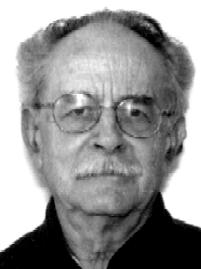 French Trotskyist leader and historian.
French Trotskyist leader and historian.
Broué was a high school student during the war, and began his political life by joining the Resistance, and then the French Communist Party (PCF). But soon after “going up” to Paris, he broke with the Party, begin unable to accept its chauvinist orientation with respect to German soldiers. At the end of the War, Broué joined the French section of the Fourth International, the International Communist Party (PCI).
In 1951-53, he was part of the majority of the PCI in its rejection of the orientation of Michel Pablo, Pierre Frank and Ernest Mandel. During the 1960s, as a history teacher, Broué began to publish, while continuing his political activity: La révolution et la guerre d’Espagne, Le parti Bolchévique, Révolution en Allemagne. ... He would become one of the principal historians of the labour and communist movement.
In 1968, Broué was a founder of the Communist Organization Internationalist (OCI) of Pierre Lambert and Stephane Just. His frequent clashes with the direction of the OCI lead him to a critical position in relation to of the direction of the Organization centred then on his historical work. The opening to the public of the files of Trotsky enabled him to build a monumental work culminating with his biography of Trotsky.
During the mid-1980s, Broué reconciled with P. Lambert, in the name of “fidélité au Front Unique.” But he was excluded in 1989 and his political activity was much reduced thereafter, but he continued with publishing, in particular the important “ History of the Communist International.”
See Pierre Broué Archive.
Brousse, Paul (1854-1912)
French petty-bourgeois Socialist. After the fall of the Commune he lived in Switzerland, where he joined the anarchists. In the beginning of the 1880s he joined the French Workers' Party and there, as leader of the Possibilist line, soon took up the fight against Marxism.
Earl Russell Browder (1891 - 1973)
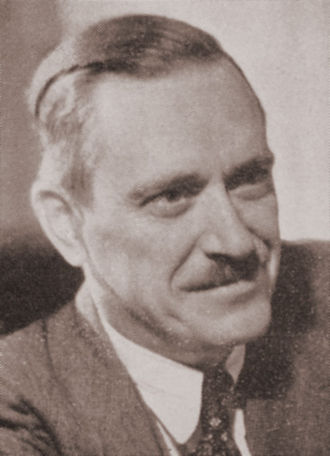 American communist and General Secretary of the Communist Party USA from 1934 to 1945. He was expelled from the party in 1946.
American communist and General Secretary of the Communist Party USA from 1934 to 1945. He was expelled from the party in 1946.
Early years
Earl Browder was born in Wichita, Kansas on May 20, 1891, the eighth child of an American-born father sympathetic to populism. He joined the Socialist Party of America in Wichita in 1907 at the age of 16 and remained in that organization until the party split of 1912, when many of the group’s syndicalistically oriented members exited the organization in response to the addition of an anti-sabotage clause to the party constitution and the recall of National Executive Committeeman William “Big Bill” Haywood. Historian Theodore Draper notes that Browder “was influenced by an offshoot of the syndicalist movement which believed in working in the AF of L (American Federation of Labor).” This ideological orientation brought the young Browder into contact with William Z. Foster, founder of an organization called the Syndicalist League of North America which was based upon similar policies and James P. Cannon, an IWW adherent from Kansas.
Browder moved to Kansas City and was employed as a office worker, entering the AF of L union of his trade, the Bookkeepers, Stenographers and Accountants union. In 1916 he took a job as manager of the Johnson County Cooperative Association in Olathe, Kansas.
Browder was aggressively opposed to World War I and publicly spoke out against it, characterizing the fighting as an imperialist conflict. After the United States joined the war in 1917, Browder was arrested and charged under the Espionage Act conspiring to defeat the operation of the draft law and nonregistration. Browder was sentenced to 2 years in prison for conspiracy and 1 year for nonregistration, sitting in jail from December 1917 to November 1918.
In 1919, Browder, Cannon, and their Kansas City associates started a radical newspaper, The Workers World, with Browder serving as the first editor. In June of that year Browder was jailed again on a conspiracy charge, however, with Cannon taking over as editor. Browder’s second prison stint, served at Leavenworth Penitentiary, lasted until November of 1920, putting him out of circulation during the critical interval when the Left Wing Section of the Socialist Party quit the SPA to form the Communist Party of America and the Communist Labor Party. A series of splits and mergers followed, with the two Communist parties formally merging in 1921.
Released from prison at last, Browder lost no time in joining the United Communist Party (UCP), as well as the fledgling Trade Union Educational League (TUEL) being launched by his old associate William Z. Foster. Browder found employment as the managing editor of the monthly magazine of TUEL, The Labor Herald.
In 1920 the Communist International (Comintern) headed by Gregory Zinoviev decided to establish an international confederation of Communist trade unions, the Red International of Labor Unions (RILU, or “Profintern”). A founding convention was planned to be held in Moscow in July of 1921 and an American delegation was gathered, including members of the American Communist Parties and the Industrial Workers of the World. Earl Browder was named to this delegation, ostensibly representing Kansas miners, with the non-party man Foster attending as a journalist representing the Federated Press.This trip to Soviet Russia incidentally proved decisive in bringing the syndicalist Foster over to the Communist movement.
Throughout the early 1920s, Browder and Foster worked together closely in the TUEL, trying to win over the support of the Chicago Federation of Labor in the establishment of a new mass Farmer-Labor Party that would be able to challenge the electoral hegemony of the Republican and Democratic parties.
In 1928, the estranged Browder and his lover Kitty Harris went to China and lived in Shanghai where they worked together on behalf of RILU’s Pan-Pacific Trade Union Secretariat, a Comintern organization engaged in clandestine labor organizing. The pair returned to the United States in 1929.
CPUSA leadership
Browder became General Secretary of the Communist party in 1930 and took over the top position of party chairman in 1932 after William Z. Foster suffered a heart attack. During his term as General Secretary, Browder embraced the popular front tactic and led the CPUSA’s tactic of expressing support for the New Deal of Franklin D. Roosevelt, while demanding that it should go much farther in terms of restructuring the capitalist system. Browder was the party’s candidate for President of the United States in the 1936 presidential election but won only 80,195 votes. During this time, Browder made at least one and possibly two trips to the Soviet Union on a false U.S. passport. After admitting he had traveled on a false passport in a public statement, he was tried and sentenced to prison in 1940 for passport violations. Browder was released after 14 months when the United States joined World War II and became an ally of the Soviet Union.
In 1944, perceiving the end of the war and the possibility of postwar tension between Washington and Moscow, Browder made moves to distance the CPUSA from the Soviet Union, declaring that communism and capitalism could peacefully co-exist. This policy became known in the Party as Browderism. The CPUSA reconstituted itself as the Communist Political Association.
Expulsion from the CPUSA
With the end of the Great Power alliance at the end of World War II and the beginning of the Cold War, “Browderism” came under attack from the rest of the international Communist movement. In 1945, Jacques Duclos, a leader of the French Communist Party, published an article denouncing Browder’s policy. With the Comintern having been dissolved during the war, the “Duclos letter” was used to informally communicate Moscow’s views. William Z. Foster, Browder’s predecessor and a staunch Marxist-Leninist, led the opposition to Browder within the party and replaced him as party chairman in 1945, with Eugene Dennis taking over as General Secretary. Browder was expelled from the party in 1946.
Browder continued to campaign for his views outside the Party and criticized the CPUSA’s domination by Moscow, writing that “The American Communists had thrived as champions of domestic reform. But when the Communists abandoned reforms and championed a Soviet Union openly contemptuous of America while predicting its quick collapse, the same party lost all its hard-won influence. It became merely a bad word in the American language.”
In April 1950, Browder was called to testify before a Senate Committee investigating Communist activity. Questioned by Joseph McCarthy, Browder was willing to criticize the American Communist Party but refused to answer questions that would incriminate former comrades. He falsely testified under oath that he had never been involved in espionage activities. Browder was charged with contempt of Congress, but Judge F. Dickinson Letts ordered his acquittal because he felt the committee had not acted legally. Browder was never prosecuted for his espionage work on behalf of the Soviet Union.
Browder’s final public appearance was in a debate with Max Shachtman, the dissident Trotskyist, in which the pair debated socialism. Browder defended the Soviet Union while Shachtman acted as a prosecutor. It is reported that at one point in the debate Shachtman listed a series of leaders of various Communist Parties and noted that each had perished at the hands of Stalin; at the end of this speech, he remarked that Browder too had been a leader of a Communist Party and, pointing at him, announced: “There-there but for an accident of geography, stands a corpse!”
An attempt to reinstate Browder in the CPUSA following the Twentieth Party Congress and the move to destalinization failed. He remained outside of the party until his death in Princeton, New Jersey on June 27, 1973.
[Composed by Tim Davenport]
Brown, John (1800-1859)
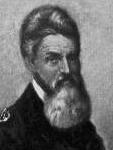 American abolitionist, hanged in 1859.
American abolitionist, hanged in 1859.
John Brown was born in May 1800 in Torrington, Connecticut, but his family moved to Ohio in 1805 where his father worked as a tanner. His father was staunchly anti-slavery and was a voluntary agent for the “Underground Railroad.”
Brown had a variety of different jobs including tanner, wool merchant, land surveyor and farmer, and was the father of twenty children to two wives. In 1849, Brown and his family settled in a black community founded in North Elba on land donated by the Anti-Slavery campaigner, Gerrit Smith.
While at North Elba, he became convinced that force was necessary to overthrow slavery. After the passage of the Fugitive Slave Law in 1850, Brown recruited forty-four men into the United States League of Gileadites, an organization founded to resist slave-catchers.
In 1855 Brown and five of his sons moved to Kansas Territory to help anti-slavery forces obtain control of this region. His home in Osawatomie was burned in 1856 and one of his sons was killed. With the support of prominent Abolitionists, he moved to Virginia and established a refuge for runaway slaves.
In 1859, he led a successful attack on the federal armory at Harper's Ferry. Brown hoped that his action would encourage slaves to join his rebellion, enabling him to form an emancipation army. But two days later the armory was stormed by Robert E. Lee and a company of marines. Brown and six men barricaded themselves in an engine-house, and continued to fight until Brown was seriously wounded and two of his sons had been killed.
He was tried and convicted of insurrection, treason and murder and hung with six other on 2nd December, 1859.
See John Brown Archive.
Bruhn, Karl von (1803-)
German communist journalist. Expelled from the Communist League in 1850. Later, 1861-66, editor of the Lassallean paper Nordstern, Hamburg.
Bruuwer, Luitzen (1881 - 1966)
 Dutch mathematician, founder of mathematical Intuitionism and topology; his derivation of mathematics without use of the “Law of the Excluded Middle” prefigured relativistic and other non-standard systems of logic, tending to undermine the dominant view that the laws of logic can provide an a priori foundation for mathematics and science generally.
Dutch mathematician, founder of mathematical Intuitionism and topology; his derivation of mathematics without use of the “Law of the Excluded Middle” prefigured relativistic and other non-standard systems of logic, tending to undermine the dominant view that the laws of logic can provide an a priori foundation for mathematics and science generally.
Bruuwer taught at the University of Amsterdam from 1909 to 1951 but all his really creative work was done before 1913.
From the very beginning, in his doctoral thesis, On the Foundations of Mathematics (1907), Bruuwer attacked the Logicist approach (see Frege) to the foundations of mathematics and his name is identified with the Intuitionist school in the foundations of mathematics, which views mathematics as mental constructions governed by self-evident laws. In On the Untrustworthiness of the Logical Principles, he rejected as invalid in mathematical proofs, the use of the principle of the Excluded Middle, which asserts that every mathematical statement is either true or false and no other possibility is allowed.
In connection with his studies of the work of David Hilbert, he developed a number of ‘fixed-point theorems’, important in the foundations of branches of mathematics as diverse as differential equations and game theory. In 1911 he published his theorems of topological invariance, which he brilliantly connected with Georg Cantor's work on Set Theory and Transfinite numbers. Bruuwer may be considered the founder of Topology, at that time, the most abstract and fundamental of mathematical conceptions, concerned with the connectivity and other fundamental properties of mathematical space.
In 1918 he published a set theory, the following year a theory of measure, and by 1923 a theory of functions, all developed without using the principle of the Excluded Middle. See his Cambridge Lectures on Intuitionism (1951).
Bryant, Louise (1885-1936)
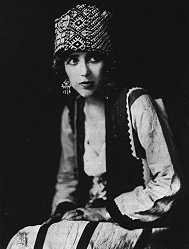 Louise Bryant was born and raised in Reno, Nevada. She moved to Portland when she was twenty to attend the University of Oregon. There she became active in the women's suffrage movement and began her career as a writer. She was married to a successful dentist when she met John Reed, who would become her partner and professional colleague until his early death in 1920. Shortly after meeting they moved to New York where they associated with a group of radical journalists centered around the magazine The Masses. Bryant wrote numerous political articles, poetry and was a war correspondent in World War I. Her book Six Red Months in Russia, made her an authority on the Russian government, its foreign policy, and socialism.
Louise Bryant was born and raised in Reno, Nevada. She moved to Portland when she was twenty to attend the University of Oregon. There she became active in the women's suffrage movement and began her career as a writer. She was married to a successful dentist when she met John Reed, who would become her partner and professional colleague until his early death in 1920. Shortly after meeting they moved to New York where they associated with a group of radical journalists centered around the magazine The Masses. Bryant wrote numerous political articles, poetry and was a war correspondent in World War I. Her book Six Red Months in Russia, made her an authority on the Russian government, its foreign policy, and socialism.
Further Reading: Marxist Writers: Louise Bryant
The Portland Years of John Reed & Louise Bryant.